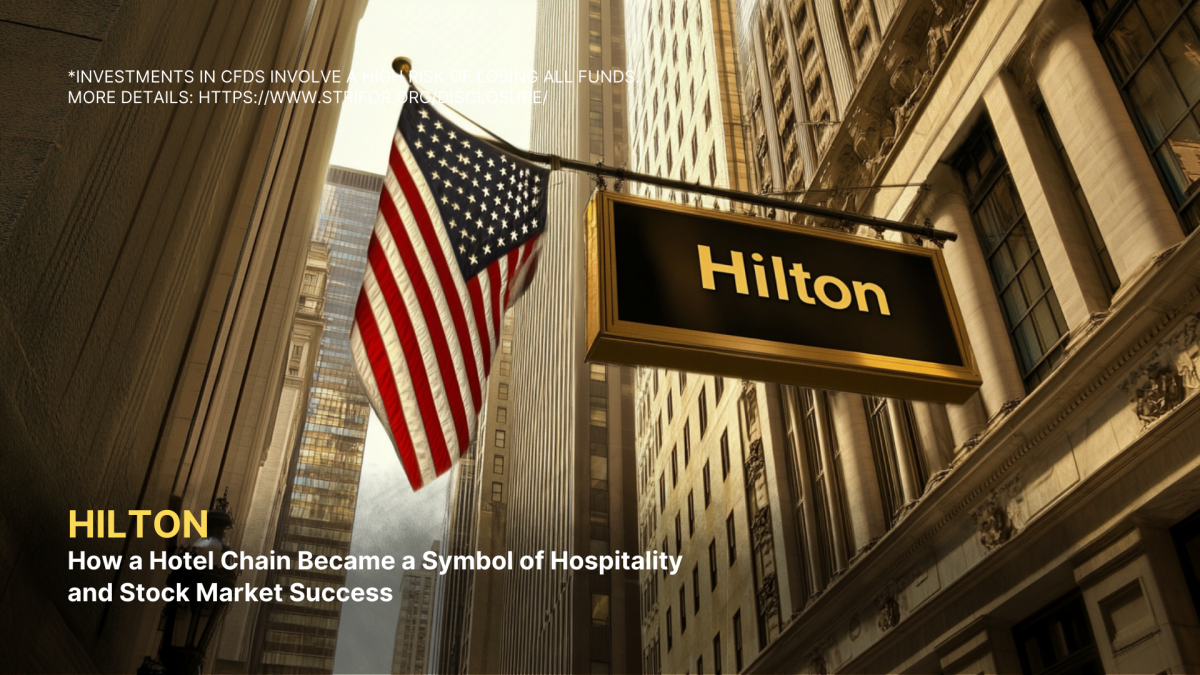
HILTON – How a Hotel Chain Became a Symbol of Hospitality and Stock Market Success
Hilton is not just a hotel chain but a whole story about how one idea can change an industry. Founded nearly a century ago, the company has become a symbol of luxury, innovation, and stability. Today, its shares are traded on the New York Stock Exchange (NYSE), attracting the attention of both long-term investors and traders looking for interesting opportunities. But what makes Hilton so unique? Let’s break it down in today’s Strifor review
Success Story: From a Small Hotel to a Global Chain
The Beginning
It all started in 1919 when Conrad Hilton bought his first hotel — the Mobley Hotel in Cisco, Texas. Even then, he realized that success in the hotel business depends on attention to details and high-quality service. By 1943, Hilton became the first hotel chain in history to have its shares traded on the stock exchange.
Expansion and Innovation
1949: Opening of the first international hotel — Caribe Hilton in Puerto Rico. It was not just a hotel but a true resort that set new standards for the industry.
1950s: Hilton pioneered the use of televisions in hotel rooms and centralized booking systems.
1960s: Introduction of Hilton Inn — the first mid-range hotel chain, allowing the company to reach a wider audience.
The Modern Era
Today, Hilton operates over 7,000 hotels in 123 countries worldwide. The company’s brands include Waldorf Astoria, Conrad, DoubleTree, Hampton, and others, allowing Hilton to cover all market segments — from luxury resorts to budget hotels.
Innovations That Changed the Hospitality Industry
Digitalization
Hilton was one of the first to implement a mobile app that allows guests to choose rooms, check in, and even unlock doors using their smartphones. These innovations improved customer convenience and reduced operating costs.
Hilton Honors Loyalty Program
With more than 150 million members, this program has become one of the most successful in the industry. It retains customers and generates a significant portion of the company’s revenue.
Economic Perspective: Why Is Hilton Attractive to Traders?
IPO (and Re-IPO)
Hilton first went public in 1943, but in 2007 it was acquired by private equity firm Blackstone. In 2013, Hilton became a public company again, conducting one of the largest IPOs in the history of the hotel industry, raising $2.35 billion.
Key Indicators
- Market capitalization: Over $50 billion, with some forecasts predicting it may exceed $60 billion by 2025.
- Income: In 2024, the company’s revenue reached approximately $11 billion — nearly three times higher than in 2021, thanks to the post-pandemic tourism recovery.
- Dividends: Hilton regularly pays dividends, making its stock attractive to long-term investors.
Volatility and Liquidity
Hilton stock (ticker: HLT) exhibits moderate volatility, making it interesting for both long-term investors and traders working with short-term price fluctuations.
Interesting Facts About Hilton
- First air-conditioned hotel chain: In the 1940s, Hilton became the first hotel chain to install air conditioning in all its rooms.
- Lunar hotel: In 1967, Conrad Hilton announced plans to build a hotel on the Moon. Although the project was never realized, it became part of the company’s legend.
- Famous guests: Celebrities such as Elvis Presley, John Lennon, and Michael Jackson have stayed at Hilton hotels. In 1964, The Beatles gave their first U.S. concert at the Washington Hilton.
- Record-breaking suite: The most expensive suite in Hilton’s history is the Penthouse Suite at the Waldorf Astoria in New York, costing up to $50,000 per night.
- Hilton and Hollywood: Hilton hotels frequently appear in movies and TV series. For example, The Beverly Hilton hosts the annual Golden Globe Awards ceremony.
Why Is Hilton More Than Just Hotels?
Cultural Influence
Hilton has become part of pop culture — from movies (for example, Crazy Rich Asians, featuring the Marina Bay Sands hotel managed by Hilton) to music videos. This not only strengthens the brand but also attracts new customers.
Social Responsibility
The company actively participates in charitable projects, such as supporting veterans and fighting homelessness. This strengthens its reputation and makes the brand more attractive for modern consumers.
Conclusion
Hilton is not just a hotel chain but a company that has been setting trends in the hospitality industry for over a century. Its stock is attractive to both long-term investors and traders looking for stable assets with growth potential. And with Strifor, you can trade Hilton CFDs and stocks of other major global companies on competitive terms. Join us — because we always pay!
Attention! An investment in CFDs carries the high risk of losing all investments funds. 87% of retail investor accounts lose money when trading CFDs with this provider. Past investment success does not mean future success.

 Personal area
Personal area





